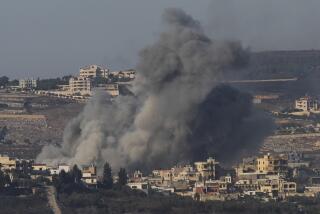Displaced Palestinians Put Faith in Jihad
SHATILA REFUGEE CAMP, Lebanon — She is 54 years old and has lived her entire life in a cramped, polluted warren of cinder-block buildings. She never had children, she says, because of the life they would have as the offspring of a Palestinian refugee.
“We are the living dead here,” Khadijeh Khatib said as she sat in her one-room, unheated grocery store, lighted by a single candle, her knees bouncing to keep warm. “There is nothing, no decent living conditions, no security. We are living in total chaos.”
This refugee camp, the scene of a massacre two decades ago by a Lebanese Christian militia allied with Israel, presents a serious hurdle to anyone looking to bring peace to the region. The camp is filled with 16,000 refugees, Palestinians whose families fled into exile when the state of Israel was created in 1948.
Nobody wants them--not Lebanon, which for more than half a century has denied them citizenship. And not Israel, which says the viability of its state would be threatened by their return.
The refugees in Shatila and neighboring Sabra camp are among about 4 million worldwide, most of them in Egypt, Lebanon, Jordan and Syria. The refugees came in two great waves, the first in 1948 and the second in 1967, during the Middle East War.
Arabs have consistently said that Israel must acknowledge the Palestinian refugees’ “right of return” as part of any peace treaty. But Israel has insisted that it cannot possibly take in millions of Palestinians without undermining the very nature of the Jewish state and for that reason flatly rejects the concept.
In crafting his peace initiative, Saudi Crown Prince Abdullah invoked a 1948 U.N. resolution that proposes repatriation or compensation for the refugees. Abdullah’s proposal said peace must include “achievement of a just solution to the Palestinian refugee problem to be agreed upon in accordance with U.N. General Assembly Resolution 194.”
In this grim refugee camp, there is a palpable sense of anger and abandonment.
Virtually every family here has a rusted key or old yellowed document proving ownership of a piece of property they were forced to abandon. Everyone has a sense they are owed something.
Among those who lost families in the 1982 massacre--after which Israel’s then-defense minister, Ariel Sharon, was forced to resign--there is also hatred.
And that’s not just a personal matter, but one that threatens to undermine efforts at peace.
Nohad Srour, 37, has also lived her entire life as a refugee. Her family fled the Hebron area of the West Bank when her mother was 5 and her father was 7. The only home she knows is here, amid the concrete and cinder-block rooms.
In 1982, she was home when the Lebanese Christian militia massacred at least 700 refugees in Shatila and Sabra--including her father, four brothers and her sister. She was shot in the shoulder but says she survived by playing dead.
On Thursday, Srour sat in her damp apartment, an old color television shoved in a corner broadcasting images of the Arab summit taking place in Beirut’s most posh hotel a few miles away. She opposes the Saudi peace initiative endorsed at the summit. The only solution, she says, is to continue to fight so that someday she can return.
“It is just like an anesthetic to our people,” she said of the peace plan. “There is no solution but resistance and jihad. This is a scam. The Arab leaders have been conspiring against our people.”
Her husband, Ali, got together a few years ago with other refugees from his birth village and published a book. In it are hand-drawn maps, tax receipts, even black-and-white pictures, anything he could come up with to keep the memory alive for his children.
Nothing will ever convince Ali of a key element of the Saudi proposal, that Israel has a right to exist--at the expense, as he sees it, of his family.
“It will be very hard to coexist with the Israelis,” he said. “Jihad is the only solution.”
More to Read
Sign up for Essential California
The most important California stories and recommendations in your inbox every morning.
You may occasionally receive promotional content from the Los Angeles Times.










